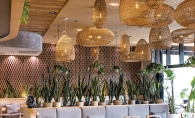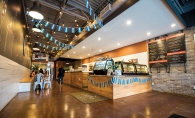To eat a meal at Khyber Pass Café is to be fed in the most nourishing sense. The food is restorative and filling, the kind a weary traveler would want set down before her. Above the laden plates, art covers the walls and Afghan rugs hang low; the music of the rubab, an Afghan string instrument, floats through the restaurant. It’s an enriching ambience that evokes at once the inherent allure of a foreign land and the deep comfort of arriving home.
For owners Masooda and Emel Sherzad, those sentiments resonate deeply. The two have been running Khyber Pass for 25 years, though the restaurant has been around since 1986. It was Masooda’s family who opened it after fleeing through the mountains from Kabul to Pakistan, then eventually settling in the United States. Emel was a student at Macalester when he discovered the Afghan restaurant.
“I went and ate and introduced myself to the family,” he says. “I started working there on weekends.”
He, like Masooda, had been uprooted from his native country, when he was forced to leave during the 1978 coup. He finished high school in Switzerland, then came to the United States to study Spanish, Portuguese and art. After Macalester, he went out east for graduate school. Not two years later, he returned to Minnesota to marry Masooda and take over the restaurant with her. Soon he was adding his own family recipes to the menu.
“In Afghanistan,” Emel says, “food is very much a family affair.” He recalls how his parents would use the term “foreign” to describe the food made by other families. It all looks the same, he grants, but to a native palate, the taste is quite different from one house to the next.
In general, Afghan cuisine incorporates elements of Persian, Middle Eastern, Central Asian and Indian food. Spices like coriander, cumin, turmeric, cardamom and curry impart vibrant colors and tastes that are, as Emel puts it, bolder than Persian food but more subtle than Indian food.
At Khyber Pass Café, the lunch buffet ($10.50) is a welcome sight to the uncertain diner. Each item is clearly labeled and includes a recommended sauce pairing—a helpful touch for anyone who wouldn’t think to drizzle cilantro walnut chutney on the chicken kebabs or dollop yogurt sauce alongside braised eggplant. Our advice? Try a bit of everything, including the cool, custardy firni, a milk pudding flavored with cardamom and rose water. At meal’s end, the creamy chai ($2.50) is as comforting as settling, well fed, into a warm bed.
One meal at Khyber Pass is all it takes to justify its inclusion in the recently published 1000 Foods to Eat Before You Die: A Food Lover’s Life List by former New York Times restaurant critic Mimi Sheraton. But despite the restaurant’s critical acclaim and prime location at the corner of Grand and Snelling, business isn’t always predictable.
“People are creatures of habit,” Emel says. “It’s still not a familiar cuisine. And I think given the political climate, that makes it even less popular.”
Because of that general reluctance, both Masooda and Emel have a fundamental appreciation for those who do venture through their doors.
“The type of people who come in here are by definition adventurous and open-minded,” Emel says. “And I like to surround myself with such people.”
One of those people is Naomi Perman, a Saint Paul resident and Khyber Pass regular since the late ’80s. When Perman considers what it is that keeps her coming back, she first describes the food: reliable, flavorful and, in reference to the lamb chops (market price), extraordinary. But the conversation soon turns to Emel and Masooda.
“Once they took over operations, it was like visiting relatives,” Perman says. “My husband died two years ago, and while he was sick, they were very supportive. Now I come in and they track my progress, see how I’m doing.”
Khyber Pass Café is one of the only metro area restaurants that serve exclusively Afghan cuisine (hummus is the only non-Afghan menu item; they decided to include it simply because people expected it). Photographs by world traveler George Pfaff line the walls, along with paintings by Emel, who grew up around artists and the smell of oil paint. And every Thursday night, Khyber Pass features live music.
“Music and food have this thing in common,” Emel says, “where political borders become meaningless.”
For Emel, who moonlights as a KFAI radio host once a week, music is religion. He extols its ability to unite humanity, and he subsists on regular jam sessions—he calls them “soul-blending sessions”—with fellow musicians. Meanwhile, Masooda has taken north Indian classical dance classes and is, according to Emel, an encyclopedia of Bollywood music.
It’s hard to imagine two spirits better suited to welcoming the weary traveler.









